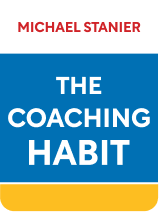

This article is an excerpt from the Shortform book guide to "The Coaching Habit" by Michael Bungay Stanier. Shortform has the world's best summaries and analyses of books you should be reading.
Like this article? Sign up for a free trial here .
Looking for some coaching tips to make you a better coach, manager, or leader? How might you take your coaching skills to the next level?
As a coach, you already know some great questions you can ask to move your clients or team members forward. But you probably could benefit from some coaching tips on the best way to ask those questions.
Continue reading to get a few coaching tips to take you to the next level.
4 Coaching Tips for Effective Asking
It’s not enough just to know and robotically ask powerful coaching questions. Take your coaching skills a step further by knowing the most effective way to ask them. There are four elements of “effective asking”: pacing, straightforwardness, engagement, and consistency.
Coaching Tip #1: Mind Your Pace
As you start your new coaching habit, you may feel unsure of yourself or wonder if your team members will be receptive to your new way of doing things—you may rush through your coaching to “get it over with.”
With a full set of coaching prompts in your toolbox, you might be tempted to fire them off one after the other. However, your direct report may feel overwhelmed if you ask them too many questions at once.
It’s most effective to launch your questions one at a time. Wait for your team member’s response, really listen to it, and consider the best response before launching into your next question.
Embrace Silence
Be comfortable with silence, and allow the conversation some breathing room. You don’t have to fill every second with conversation, nor do you have to keep prodding the other person to say something—sometimes they may need time to get their thoughts in order before speaking up. Don’t say anything for a few seconds to give the other person the chance to come up with thoughtful responses.
Coaching Tip #2: Be Straightforward
The seven essential questions are meant to help you get directly to the heart of issues—make sure you’re letting them do their job.
Don’t Beat Around the Bush
If you already know what you’re going to ask, just ask. Hemming and hawing will only needlessly prolong a conversation. If you feel uncomfortable asking a question or think that your question might sound too blunt, preface it with phrases such as, “Out of curiosity…” or, “To make sure that I understand…”
Don’t Disguise Advice as a Question
Sometimes you want the other person to get to the solution you want without making it seem like you want things done your way. So, you ask questions like, “Have you considered…?” to put your ideas and solutions in their mind.
Whenever you’re tempted to give advice disguised as a question, resist your bad habit—instead try asking, “Anything else?” Only after hearing everything the team member has thought of should you offer your own ideas.
Coaching Tip #3: Engage
Make sure that, in addition to asking the seven essential questions, you’re paying attention to both their attitudes and their responses.
Use “What” Questions
While “Why?” is a useful question in many situations, it may sound judgmental when it comes to coaching and make people feel defensive. Reframe your “why” questions into less intimidating “what” questions.
- For example, instead of asking, “Why did you do that?” try asking, “What kind of outcome were you hoping for?”
Give Your Full Attention
While this book focuses on the seven essential questions, they only contribute to half of your coaching success. The other half is really listening to the other person’s response. Turn off distractions such as email or phone notifications, and consciously put aside thoughts like deadlines or what you’re having for lunch. If you catch your mind drifting, just get back in the moment and refocus.
Be an Active Listener
Embracing silence and stopping yourself from doling out advice doesn’t mean that you should be a completely passive audience to your team member. Instead, show that you’re listening to them by engaging with what they’re saying.
- For example, “Great idea” or, “Yes, that sounds like a good solution” are simple ways to acknowledge what they’ve said before you move onto the next question.
Coaching Tip #4: Be Consistent
Keep coaching, even when you’re not face-to-face. These days, much of the interaction between team leaders and team members takes place online via email, text, and messaging apps. This means you have fewer opportunities for face-to-face coaching, but don’t discount the power of remote coaching.
- For example, when someone sends you a lengthy email about a dilemma at work, use it as an opportunity to ask a question, rather than replying with detailed advice. You can say something like, “Before I send a more detailed reply, can you tell me what the central challenge is for you?”
Commit to your habit of being curious and regularly coaching your team by asking the seven essential questions and making use of the conversational tips above. If you think of new coaching questions that would fit into your team environment, work them into your conversations as you would the seven essential questions. By building up these good habits, you’ll greatly improve your coaching skills and be better able to help your team members become more valuable players.

———End of Preview———
Like what you just read? Read the rest of the world's best book summary and analysis of Michael Bungay Stanier's "The Coaching Habit" at Shortform .
Here's what you'll find in our full The Coaching Habit summary :
- How to turn coaching into an informal, effective daily habit
- Why you should practice listening instead of speaking for 10 minutes a day
- The seven essential questions to ask your team members






